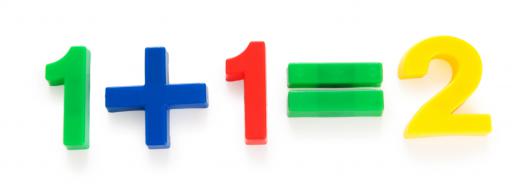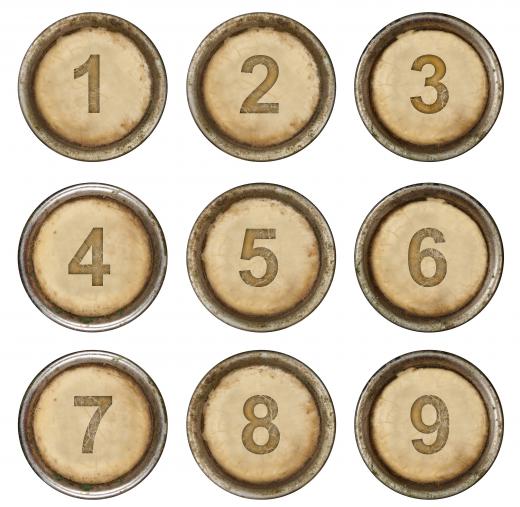What is a Whole Number?
 Tricia Christensen
Tricia Christensen
The term "whole number" is typically used in mathematics. It is frequently defined by what it does not contain: it cannot be a fraction of a number, a percentage, or have a decimal. While a number like 21.32 has a whole number portion of 21, this number is not "whole" because it contains a decimal of 0.32. Whole numbers are also often defined as non-negative integers, including zero.
Purpose for Identifying Different Number Types

While the definition for a whole number may seem unnecessary to some, it can make it easier for children to understand the properties of integers. Integers and whole numbers are not the same, but all whole numbers are integers. The difference is that integers include negative numbers, while all whole numbers are non-negative. Zero is neither positive nor negative.

Properties that apply to whole numbers include the "zero property of addition" and the "commutative property." The zero property of addition indicates that any whole number added to zero equals that number, such as 0 + 23 = 23. While the commutative property means that order does not matter when multiplying or adding two integers; meaning that 3 x 4 = 4 x 3 and 3 + 4 = 4 + 3. These are important concepts that can make other mathematical procedures easier.
Different Types of Numbers
Related to whole numbers are "natural numbers," sometimes referred to as "counting numbers." These are typically the first numbers children learn. Natural numbers may include zero, although counting numbers typically do not; zero is not included as a counting number because it has no value and so it cannot really be counted. A whole number, natural number, and counting number sequence would be something like {1, 2, 3, 4,...}, while whole numbers would also include 0.
The Importance of Whole Numbers
Integers matter when teachers ask students to round their math answers and for some practical applications. At some point in people's lives, they typically need to figure out simple math in their heads. For example, someone considering the price $29.95 US Dollars (USD) for lunch at a restaurant may need to figure out how to tip according. While some diners might want to tip to the exact penny, others merely round up or down to the nearest whole number to determine the tip. Thus a diner can round $29.95 USD up to $30 USD to determine a simpler value for the tip.
Even organizations like the Internal Revenue Service (IRS) in the US prefer to work with integers instead of decimal values. People can typically round up or down when determining deductions, income, and other values while filing tax information with the IRS. Some people round up only when it comes to disbursements from the IRS, and round down to a whole number when estimating their total taxable income, ensuring the most advantageous number in each instance.
People often laugh at the use of seemingly nonsensical decimal numbers in statistical reports, such as the idea of an average family having 2.5 children. Converting this type of value to a whole number, since there is no such thing as 0.5 of a child, makes these statistics more useful. It is more meaningful to considered that "the average family has two to three kids," rather than an impossible decimal.
AS FEATURED ON:
AS FEATURED ON:












Discussion Comments
I have always struggled with order of operations.
What is a mixed number?
Is 20 a whole number?
What would 62.499 be as a whole number -- 62 or 63?
What is the nearest whole number to 457 which is divisible by 11?
is 99 a rational number?
is 45 a whole number?
is 047856.05643 a whole number?
yes 11 is a whole number.
it's good but i need an introduction. but i am using this site daily. Thank you!
You say on one part of this site only positive numbers can be a natural number, then here you call 0, -1, -2, etc are natural numbers. Which is it?
What is the smallest whole number that, when divided by 2, leaves a reminder of 1; when divided by 3, leaves a reminder of 2; and so on, up to leaving a reminder of 9 when divided by 10?
Anon31382: The nearest whole number to 137.5842 is 138. 137.5842 must be rounded up because the first digit after the decimal point is a five, and numbers between 5 and 9 are (usually - 5 is a bit of a contentious matter if you are looking at maximum and minimum possible values, but just use this rough rule unless you have to look at them).
Anon30835: 11 is a whole number as it does not have a fraction (or a decimal).
Anon14380: The largest 2 digit whole numbers are 99 and 98.
Nera789: You're right, 0.34 is only a rational number.
Decimals *cannot* be whole numbers (remember, to be a whole number, it must not contain a fraction; decimals are equivalent to fractions). This means that 0.34 cannot be a whole number, an integer (i.e. a positive or negative whole number or a natural number).
0.34 is not irrational: as you rightly pointed out, it does not go on forever. Therefore it can only be a rational number out of the options you have been given.
Onemfox: $118, 250.00 is an integer representing an amount of money. The comma is placed after first 3 digits (between the number for the thousands and the number for the hundreds) to make it easier to read. This does not affect whether it is an integer or not. Because there are only zeroes after the decimal point, it still counts as a whole number (i.e. nothing is there). You could refer to this as a 'positive integer', a whole number or a 'counting/natural' number. Those terms all apply.
Hello all! Please forgive my ignorance when it comes to math, I am 49, getting ready to graduate from college *if* I can pass Algebra! Don't laugh, well you can a little, it is sort of funny.
Anyway, I need to understand what integer would represent the total, $118,250.00?
Since Algebra is alien for me, I am very lost because this is just a total amount of cash for me.
It does not equal in my head into Algebra language for me. If it is not too much trouble could you explain all the differences so I may understand which type of integer this number represents. It has whole numbers, but it has a comma and a decimal point. This for me is a huge issue and I need some clarification no latter than Friday.
Thank you to whom ever.
Can a decimal be a whole number? this is the question I'm stuck on-
Name the set(s) of numbers to which 0.34 belongs.
a. rational numbers
b. natural numbers, whole numbers, integers, rational numbers
c. rational numbers, irrational numbers
d.none of the above
I want to say A, because 0.34 doesn't go on forever. But I don't know if a decimal is a whole number. Please answer, need by tomorrow!!
137.5842 what is nearest whole number?
Is number 11 a whole number?
Please if you can help answer this question for me I would appreciate it.
Please enter your value as an integer (no decimals please). As a quick clue, the marrows usually weigh anywhere between 200 and 800 pounds (yes they are very heavy!)
Please post and put my name at end of Post so I know it has been answered. Thanks Much. Alica
what is the largest two digit whole numbers?
So whole numbers (0, 1, 2, 3...) are the counting numbers (1, 2, 3, 4...) plus 0. Although, I think I've heard some people say that whole numbers don't include 0 -- there's some dispute. Natural numbers, depending on who you ask, are either the same as whole numbers or counting numbers. And, integers (...-3, -2, -1, 0, 1, 2, 3...) are whole numbers (including 0) plus the negative whole numbers (although I don't think negative whole numbers is a technically accurate term). It can be confusing to keep it all straight! Especially since there is dispute on some of the definitions!
Post your comments